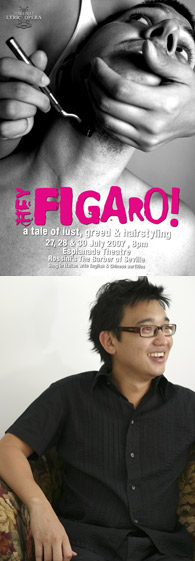Why should a gay man (or a gay woman, for that matter) care about opera? Unless you're already a classical music buff, or you've a fetish for the three tenors or fat women in Viking helmets, chances are that you've never even thought about watching an opera - that you see it as a stuffy, aristocratic genre, sung in foreign languages, completely irrelevant to modern day experience.

Above: Singapore Lyric Opera's Artistic, Education and Outreach Manager Adrian Poon.
As the Artistic, Education and Outreach Manager of the Singapore Lyric Opera, Adrian's had a life filled with music - piano lessons from the age of 4, vocal training at 14, percussion lessons, recording labels, compositions, choir and solo tours in Austria, Australia, Hungary, Italy, Japan and Malaysia - you name it. Right now, however, he's concentrating his efforts on making opera more accessible to a local audience with SLO's new production of Hey, Figaro!, an updated version of Rossini's famed comic opera The Barber of Seville.
Advertised as a story of love, greed and hairstyling, Hey, Figaro! tells the tale of the spoilt, beautiful Rosina and Count Almaviva, a young man who dresses up in an array of disguises to win her heart, aided by the gossipy barber/hairdresser Figaro. Aside from its exquisite music - listenable, lively pop music of the 19th century, Adrian says - the show's going to be made even more accessible through the guidance of director David Edwards, who's been in thick conference with costume designer Hella Chan and set designer GOSH Design over the new, modern outlook.
"Our role model for the hairdresser in this case was David Gan (a celebrity hairstylist In Singapore)," says Adrian. "We read so much about him and his association with TV and movie stars and how people trust him with their secrets like a confidante. This is like Figaro with Count Almaviva... how they set about to woo and win Rosina. Things of course happen along the way."
Adrian also describes how the characters will be identified with celebrity icons of the 20th and 21st centuries such as Elvia and Nigella Lawson, building on the audience's familiarity with pop iconography to help them identify with the classic text. But purists needn't be dismayed. "We are doing the original opera, in the original language," Adrian clarifies. "The work itself is intact; it's just that the staging is different."
Contemporary stagings of classic operas are a pretty new thing for the SLO, which was founded only in 1990 on an ad-hoc basis with the National University of Singapore. Since then, it's become the most established opera company in Southeast Asia, and is trying to forge links with fellow companies in South Korea and China. Adrian expects many more modern stagings to happen under the management of Ms Ng Siew Eng, drawing in younger audiences and proving to them that an opera isn't a museum piece to be preserved in a glass cabinet, but a living art form. I'd say it's high time - in the US, they've been doing creative stagings of the classics for some time now, such as Peter Sellars's 1991 production of Mozart's Don Giovanni, set in a drug-ridden Spanish Harlem.
I asked Adrian about connections between opera and the gay community. He was able to name a few gay composers - Francis Poulenc, Aaron Copland and Tchaikovsky came to mind, as well as partners Samuel Barber and Gian Carlo Menotti. What he didn't know is that Guardian writer Tim Ashley's done an absolutely wonderful essay about gay themes in opera (click here), from the mythic lesbianism in Francesco Cavalli's La Calisto in the 17th century to the titanic love affair between composer Benjamin Britten and tenor Peter Pears in the 20th century, birthing in the unabashedly homoerotic operas Billy Budd and Death in Venice. Rossini himself wrote a scandalous work entitled Le Comte D'Omry, which includes a bisexual threesome with the titular character dressed as a nun. And in 1995, Americans Stewart Wallace and Michael Korie created Harvey Milk, an opera on the famed 1970's gay politician, featuring a full cast of leather queens and Nazis.
As the elder cousin of musical theatre, opera definitely has the potential to make a comeback among gay and straight audiences alike; to once again become - and here's the inevitable word - fabulous. All that needs to happen is for directors and audiences to let go of their conservative misgivings, and give new stagings like Hey, Figaro! a chance.
Venue (Singapore): Esplanade Theatre
27-30 July, 2007, 8pm (no show on 29 July)
Prices: From $25 to $150
Ticketing: SISTIC
